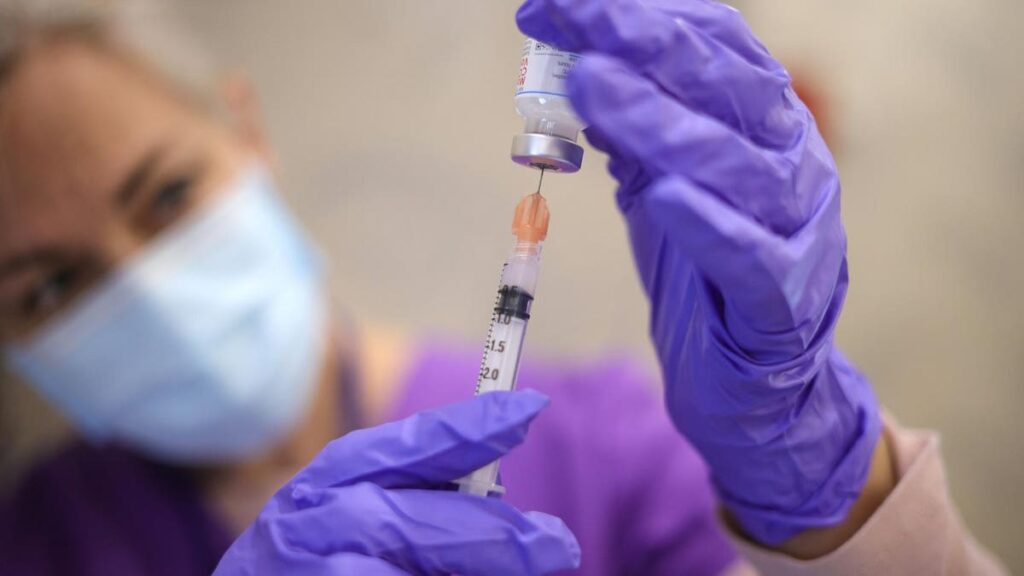Topline
The Food and Drug Administration could approve new Covid-19 vaccine boosters as soon as Friday, NBC reported Wednesday, offering more protection against the coronavirus’ dominant XBB sublineage, which is causing a spike in deaths and hospitalizations in the U.S.
Nurses draw vaccine doses from a vial as Maryland residents receive their second dose of the Moderna … [+]
Key Facts
The Friday timeframe isn’t a set date, so the approval could potentially happen sometime next week, according to NBC, which cited multiple unnamed sources.
This comes after the agency encouraged Moderna, Pfizer and Novavax to create new monovalent vaccines that target the XBB lineage, which makes up the majority of the variants circulating in the U.S.
A Centers for Disease Control and Prevention advisory committee will meet next week, and it’s expected to vote on the shots and make recommendations on who should get the updated boosters.
This is the first time since the shots were commercialized that they won’t be free, and both Pfizer and Moderna estimate their shots will cost between $110 and $130 a dose.
Though most insurance companies are expected to cover the cost of Covid boosters, the CDC’s Bridge Program is set to launch this fall, providing Covid vaccine coverage to the uninsured.
Key Background
Covid-related deaths and hospitalizations have increased since the start of the summer and are expected to keep rising as fall and winter kick into gear. Deaths increased by almost 18% between July 8 and August 26, and hospitalizations grew by about 16% between July 28 and August 26, according to the CDC’s most recent data. EG.5, or the “Eris” variant—part of the XBB lineage—is the dominant strain in the U.S., making up nearly 22% of all cases between August 20 and September 2. As of June, the XBB omicron subvariants made up 95% of all Covid cases in the U.S., according to an FDA report. The existing bivalent boosters offer about 50% protection against XBB variants in most adults and about 33% protection in those 65 years and older, according to a January study conducted by the CDC. Moderna said its new booster may be effective at protecting against the Eris variant, Novavax said its shot provided a broad immune response against Eris in small animals and Pfizer reported its new shot protected against the variant when tested on mice. Because the current bivalent boosters don’t specifically protect against XBB, some experts recommend waiting until the new monovalent boosters release before getting an updated shot.
Contra
An earlier round of updated Covid boosters provided additional protection against previous variants, but only 17% of the U.S. has received at least one booster.
Tangent
A new Covid variant called BA.2.86, or “Pirola,” is a descendant of the BA sublineage and has begun circulating in the U.S. Although there aren’t enough cases for it to appear on the CDC’s variant tracker, the World Health Organization has labeled it as a variant under monitoring. This is because Pirola has 36 more mutation spikes than XBB.1.5—the dominant strain in the U.S. earlier this year—and 34 additional mutations compared to BA.2. Pirola isn’t a descendant of the XBB sublineages, so there may be concern they won’t protect against Pirola. However, Moderna said Wednesday its new booster provided an 8.7-fold increase in neutralizing antibodies against Pirola in its clinical trial.
Further Reading
FDA could green light new Covid boosters as early as Friday (NBC)
Moderna’s Updated Covid Vaccine Is Effective Against Pirola Variant—As Concern Over New Strain Grows (Forbes)
New Covid Boosters Expected This Fall: Why Some Doctors Suggest Holding Off On Getting Your Next Booster Until Then (Forbes)
It’s Okay To Get Your Covid, Flu And RSV Shots At The Same Time, Experts Say (Forbes)


